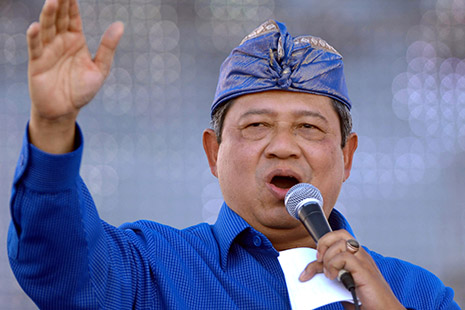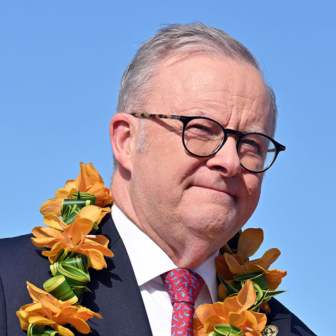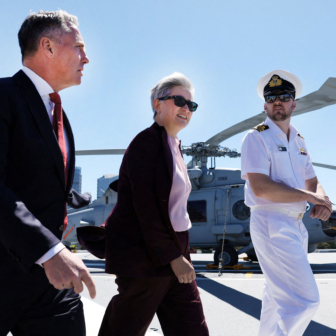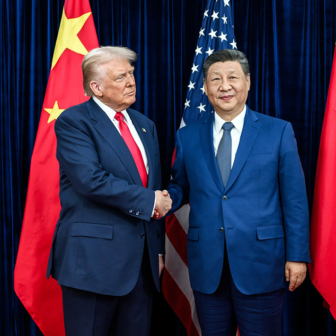A POPULAR bumper sticker among Indonesian Islamic activists in recent years declares: “Islam is the solution.” For many of these activists, this slogan captured a mood of Islamic revival and confidence – a sense that Islam was reasserting itself in the social and political life of the country after years of marginalisation.
The results of last month’s legislative elections, however, provide compelling evidence that this sanguine attitude is misplaced, at least for the moment. Despite the fact that almost 90 per cent of the electorate is Muslim, Islamic parties gained less than 30 per cent of the vote – their lowest figure over the three democratic elections held after the downfall of President Soeharto in 1998. The declining vote for these parties deserves close analysis for what it tells us about popular attitudes towards religion in politics. The majority of Muslim voters appear not to regard Islam as critical to their electoral decisions, even though it may be important in their personal lives.
Before examining the reasons for these parties’ falling support, some “mapping” of Indonesian political Islam is necessary. Of the 38 parties contesting the national elections, ten can be regarded as “Islamic” because they have either a formal ideological basis in Islam or rely on an overtly Islamic identity for most of their support. According to both the provisional result of the Election Commission and the four quick count polls conducted on election day, these ten parties are likely to gain about 29 per cent of the national vote, down from 38 per cent in 2004 and 37 per cent in 1999. All but one of the established Islamic parties suffered a decline in their share of the vote and only four of these parties gained enough votes to clear the 2.5 per cent threshold for gaining seats in parliament: the Prosperous Justice Party (PKS), currently with 8.2 per cent of the vote according the Election Commission, the National Mandate Party (PAN) with 6.3 per cent, the United Development Party (PPP) with 5.2 per cent and the National Awakening Party (PKB) with 5.2 per cent. The drop in support for PPP and PKB is especially notable: in 1999, these were the two biggest Islamic parties, but the vote for both has fallen by more than half in the past two elections.
This poor result for Islamic parties is even more striking if we consider broader historical and religio-cultural trends. In Indonesia’s first free and fair election in 1955 Islamic parties gained 44 per cent of the vote, 15 per cent more than in this year’s election – despite the fact that Islamic pietism has become far more pronounced in the intervening years. A far higher percentage of Muslims now attend diligently to regular prayer, fasting during Ramadhan, attending Qur’anic study groups, and consuming “Islamic products,” such as shari’a banking and Muslim clothing. These contrasting trends – rising religiosity and falling support for political Islam – indicate that many devout Muslims no longer see voting as “confessional” behaviour, explicitly linked to their faith.
The picture becomes more interesting if we look at the variations between the ten parties. Indonesian Islamic parties fall into two broad categories: Islamist and pluralist. Islamist parties formally proclaim an Islamic identity and seek, to varying degrees, to apply Islamic law more extensively in politics and society. All Islamist parties list Islam as their ideological foundation and many have policies for greater shari’a implementation. By contrast, pluralist Islamic parties have as their basis the religiously neutral state ideology of Pancasila and eschew pro-shari’a agendas. While not ideologically Islamic, religious identity is nonetheless a primary factor in their electoral support and most are embedded in particular sections of the Muslim community. The distinction between Islamist and pluralist Islamic parties is important because it indicates the type of politics which the various parties are likely to engage in. Of the ten Islamic parties, seven are Islamist and three pluralist. The seven Islamist parties gained 17 per cent of the total vote and the pluralist Islamic parties got 12 per cent (down from 22 per cent and 16 per cent respectively in 2004, and 16 per cent and 24 per cent in 1999). Support for pro-shari’a policies seems to be stagnant and limited to a very small minority of the Islamic community.
Why have so many Muslim voters turned away from Islamic parties? A number of factors would appear to be at play. One of the better documented is that voters have shrinking confidence in Islamic parties’ ability to address pressing socio-economic issues. Surveys conducted by the respected Indonesian Survey Institute over the past two years show an inverse correlation between the perceived “Islamic-ness” of a party and its capacity to bring prosperity to the country.
Results for PKS provide the most glaring example of this. Twenty per cent of respondents ranked it as “Islamic” but only 6 per cent credited it as “having community welfare programs,” despite the fact that PKS is the only party with extensive welfare activities and a detailed economic policy emphasising equality. The figures were worse for PKB and PPP, which scored 18 per cent and 15 per cent on the “Islamic” scale but just 2.5 per cent and 2 per cent, respectively, on welfare issues. Overall, the big four Islamic parties had a total Islamic score of 56 per cent but a mere 12.5 per cent for “community welfare.” By contrast, the combined community welfare figures for the four main non-Islamic parties – President Susilo Bambang Yudhoyono’s Democratic Party, former president Megawati’s Indonesian Democratic Party of Struggle, Golkar and Gerindra – was 43 per cent.
The same surveys showed that economic and welfare issues far out-rank religion as priorities for voters. Only 1 per cent of respondents regarded “morality and religious” issues as pressing but three-quarters ranked “the economy and people’s welfare” as paramount problems for the government to handle. Hence, the credibility gap for Islamic parties between their religious identity and perceived economic performance appears to be a central factor in explaining their poor election results.
It is not surprising that Islamic parties suffer credibility problems when we consider the performance of their ministers in cabinet and their internal instability. Five Islamic parties have party cadres or strong sympathisers in the ministry, but nearly all have been disappointing. The forestry minister, M.S. Ka’ban, who is also chairman of one of the small Islamist parties, has been dogged by a succession of corruption scandals and has been lucky to retain his portfolio. The cooperatives minister, Suryadharma Ali, who leads PPP, has been almost invisible, despite his party’s supposed commitment to economically empowering Indonesia’s Muslim poor. The public housing minister, Yusuf Asy’ari, a nominee of PKS, has been widely criticised as ineffective in a portfolio of direct relevance to community welfare. Of all the Islamic party cabinet members, only agriculture minister Anton Apriantono, who is close to PKS, can claim to have performed creditably.
Many of the Islamic parties have also been rent by serious internal divisions in recent years. PKB has had four chairmen since 2004 and been embroiled in constant legal action between various rival groups. Charismatic former president Abdurrahman Wahid, who has regarded PKB as subject to his personal whim, is now estranged from the party and attacked its current leadership repeatedly during the 2009 election campaign. Not surprisingly, the party’s once solid support base among rural Javanese Muslims has crumbled amid the turmoil, with many voting for President Susilo Bambang Yudhoyono’s PD. PPP is split into factions based on Indonesia’s two main Islamic organisations, Nahdlatul Ulama and Muhammadiyah, and its leadership has been both lacklustre and riven with tensions deriving from personality and sectional differences. PAN has been led by the millionaire entrepreneur Soetrisno Bachir since 2005, and he has proven an eccentric and at times comical figure, out of step of the party’s conservative Muhammadiyah heartland. His policy of recruiting high-profile celebrities as legislative candidates has helped to shore up PAN’s electoral support but its longer-term prospects are uncertain. The party is, moreover, deeply divided over who to nominate in the upcoming presidential election.
PERHAPS the most intriguing of the Islamic parties is PKS. This party has a number of features which distinguish it from its rivals. It is the only genuine cadre party and has a much younger, better educated and more disciplined membership than other Islamic parties. It alone among Muslim parties draws heavily upon Middle Eastern thinking, and particularly Egypt’s Muslim Brotherhood, for its ideology. PKS is also less corrupt and more intellectually engaged than other parties, and produces a large quantity of books and webpage discussion on policy and doctrinal issues.
The party’s vote leapt from 1.4 per cent in 1999 to 7.3 per cent in 2004, due largely to its clean, pro-reform image, and PKS leaders had hoped to gain at least 15 per cent at this year’s election. To help achieve this, they had made some major compromises to attract “moderate” mainstream voters, including shifting the party from an Islamist to a pluralist orientation, and remaining in the governing coalition despite evidence of growing voter disillusionment. The party was also much better funded and had access to far more detailed market research than previously. Consequently, PKS leaders were dejected at receiving just 8 per cent in the April election.
The failure of PKS to lift its vote substantially is instructive. It appears likely that the party’s compromises were met either with scepticism or disapproval by many of the electors whom it was hoping to attract. The pragmatic shift seems to have robbed the party of some of its reform credentials and perceived idealism, a process underscored by several PKS parliamentarians being implicated in corruption cases and the growing tendency of its leaders to engage in the type of high-level politicking normally associated with “ordinary” parties. PKS now faces difficult decisions about whether to continue to move to the centre of the political spectrum or to return to a more overtly Islamic stance.
While the clout of political Islam has diminished as a result of these poor election results, the four main Islamic parties will continue to be important players in Indonesian politics. Any government or opposition coalition needs to include a major Islamic party if it is to claim broad appeal. President Susilo Bambang Yudhoyono – popularly known as SBY – has shown himself to be acutely sensitive to criticism from Islamic groups, and is anxious to ensure that at least two Islamic parties are part of his governing alliance. This gives these parties some bargaining power, though they also keen to share in the spoils of government. PKS and PKB appear almost certain SBY partners, but PAN and PPP may also back the president again. PKS and PAN are hopeful that their nominees, Hidayat Nur Wahid and Hatta Rajasa, may become SBY’s running mate in the July presidential elections.
Islam’s role in Indonesian politics is changing rapidly, and it would be wrong to assume that the declining Islamic party vote signals the disappearance of faith as a political factor. Rather, the 2009 elections show that Islam’s impact is more diffuse and subtle than before and it can no longer regarded as the exclusive preserve of Islamic parties. All of the major non-Islamic parties combine Islamic appeals in their campaign messages. For example, SBY’s Democrat Party, which describes itself as “religious nationalist,” had election advertisements celebrating the anniversary of the Prophet Muhammad’s birth. The advertisement featured party leaders in Muslim attire saying that Islamic values were important to PD’s anti-corruption campaign. Megawati’s Indonesian Democratic Party of Struggle adopted a different approach, forming a high-profile Islamic wing to mobilise moderate Muslim support. This “soft” selling of Islam was commonplace in the 2009 election.
It is also possible that the existing Islamic parties can reverse their slide in support. More effective leadership, particularly with an emphasis on performance rather than clientalism or access to power, re-energised and professionalised recruitment and branch structures, and a more serious commitment to policy formation would all improve the prospects of these parties. And the strength of two of the main non-Islamic parties, PD and PDIP, may not last until the next election, given that SBY must resign as president in 2014 and Megawati is likely to stand down as party chair after the coming presidential election. Without these two pivotal figures, support for both parties could drop sharply, which may also benefit the Islamic parties. •




